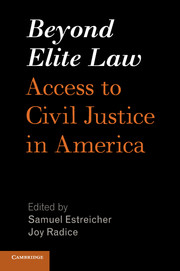Book contents
- Frontmatter
- Contents
- Beyond Elite Law
- Foreword
- List of Contributors
- Overview
- Overview
- PART I CURRENT STATE OF ACCESS TO LEGAL SERVICES
- 1 Access to Civil Justice in America: What Do We Know?
- 2 Life in the Law-Thick World: Legal Resources for Ordinary Americans
- 3 The Need for a National Civil Justice Survey of Incidence and Claiming Behavior
- 4 When Does Representation Matter?
- 5 Self-Representation and the Dismissal of Chapter 7 Bankruptcy Cases
- 6 Racial Disparities in Legal Representation for Employment Discrimination Plaintiffs
- 7 The Unemployment Action Center: A Student-Driven Response to a Legal Need
- 8 Immigrant Representation: Meeting an Urgent Need
- 9 Self-Representation, Civil Gideon, and Community Mobilization in Immigration Cases
- PART II SOURCES OF LEGAL SERVICES ASSISTANCE FOR WORKING AMERICANS
- PART III FASHIONING A REFORM AGENDA
- PART IV CREATING A CULTURE OF SERVICE
- Index
3 - The Need for a National Civil Justice Survey of Incidence and Claiming Behavior
from PART I - CURRENT STATE OF ACCESS TO LEGAL SERVICES
Published online by Cambridge University Press: 05 May 2016
- Frontmatter
- Contents
- Beyond Elite Law
- Foreword
- List of Contributors
- Overview
- Overview
- PART I CURRENT STATE OF ACCESS TO LEGAL SERVICES
- 1 Access to Civil Justice in America: What Do We Know?
- 2 Life in the Law-Thick World: Legal Resources for Ordinary Americans
- 3 The Need for a National Civil Justice Survey of Incidence and Claiming Behavior
- 4 When Does Representation Matter?
- 5 Self-Representation and the Dismissal of Chapter 7 Bankruptcy Cases
- 6 Racial Disparities in Legal Representation for Employment Discrimination Plaintiffs
- 7 The Unemployment Action Center: A Student-Driven Response to a Legal Need
- 8 Immigrant Representation: Meeting an Urgent Need
- 9 Self-Representation, Civil Gideon, and Community Mobilization in Immigration Cases
- PART II SOURCES OF LEGAL SERVICES ASSISTANCE FOR WORKING AMERICANS
- PART III FASHIONING A REFORM AGENDA
- PART IV CREATING A CULTURE OF SERVICE
- Index
Summary
This chapter by the late distinguished Cornell Law professor proposes the development of a national civil justice survey to improve our base of knowledge of civil justice needs. Using a large data sample from households across the country, this survey would estimate the incidence of civil legal problems that people face, and document how they address them, if they do at all. It would gather demographic data about the respondents including where they live and their age, gender, race, and income level. The survey data would offer a comprehensive tool for understanding what civil legal needs exist and how they might be addressed.
Civil justice issues play a prominent role in society. Family law issues such as divorce and child custody, consumer victimization issues raised by questionable trade practices, and tort issues raised by surprisingly high estimated rates of medical malpractice, questionable prescription drug practices, and other behaviors are part of the fabric of daily life. Policymakers and interest groups regularly debate and assess whether civil problems are best resolved by legislative action, agency action, litigation, alternative dispute resolution, other methods, or some combination of actions. Yet we lack systematic quantitative knowledge about the primary events in daily life that generate civil justice issues. This chapter explores the desirability of, and issues related to, creating what I refer to as a national civil justice survey (NCJS), analogous to the National Crime Victimization Survey (NCVS).
The NCVS is the primary source of information on criminal victimization. The survey enables the Bureau of Justice Statistics (BJS) to estimate the likelihood of many crimes “for the population as a whole as well as for segments of the population such as women, the elderly, members of various racial groups, city dwellers, or other groups.” In 2005, U.S. residents age twelve or older experienced about twenty violent crimes per 1,000 people and about 150 property crimes per 1,000 people. In comparison, decades-old national research on incidence of civil problems suggests that adults experience a long-term risk of serious personal injury at the rate of 120 per 1,000 and a risk of serious property damage of 400 per 1,000. A more geographically limited early 1980s survey found that a three-year risk of having a civil justice grievance was 416 per 1,000.
- Type
- Chapter
- Information
- Beyond Elite LawAccess to Civil Justice in America, pp. 53 - 70Publisher: Cambridge University PressPrint publication year: 2016



